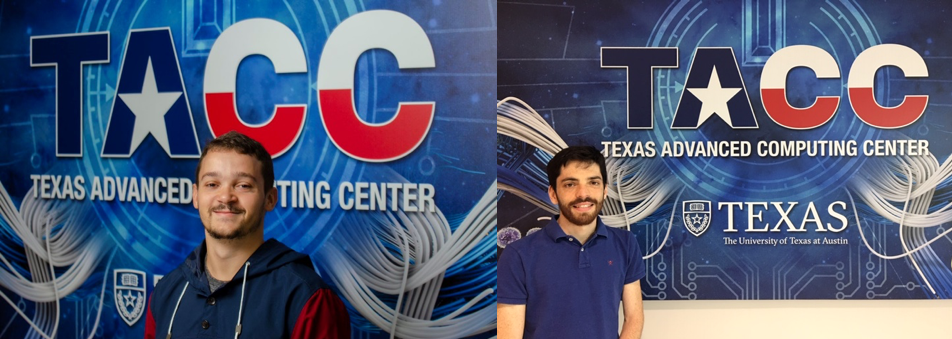João Dias and Leonardo Azevedo enrolled in the Advanced Computing Training Program in 2019. One year later, we can learn about the impact of partaking in this initiative.
Two years ago, the UT Austin Portugal Program launched the initiative Advanced Computing Training Program (ACTP), which allowed nine scientists from Portugal to be trained in high-performance computing technologies for up to four months, in one of the world’s most powerful computing facilities for the digital modeling and simulation, data management, processing and visualization – the Texas Advanced Computing Center (TACC) at The University of Texas at Austin (UT Austin).
Leonardo Azevedo and João Dias spent their time at Austin at different moments. The first, back in the spring of 2019, and the latter, in the fall of 2019. During his two-month stay, Leonardo, an Assistant Professor at the Department of Civil Engineering, Architecture and Georesources of Técnico Lisboa, worked with Professor Tan Bui-Thanh and his team, from the Department of Aerospace Engineering and Engineering Mechanics at the Oden Institute for Computational Engineering and Sciences at UT Austin. During this period, they explored and implemented prototypes of efficient methods to tackle a high-dimension inverse problem such as seismic inversion. Confident about what he learned by participating in ACTP, when asked, Leonardo does not hesitate to recommend such experience.
“I certainly acquired new skills on computer sciences, which allowed me to broaden my network of contacts and participate in projects on topics that are not my ‘natural’ domain.’”
(Leonardo Azevedo)
Having had an amazing opportunity to work up close with the expert staff and computing systems of TACC, while contributing to the institution’s mission of “enabling discoveries that advance science and society through the application of advanced computing technologies”, Leonardo praises the benefits the program has brought him. “I certainly acquired new skills on computer sciences, which allowed me to broaden my network of contacts and participate in projects on topics that are not my ‘natural’ domain’”, he explains. “As a direct result of my stay, I also improved my knowledge of inverse problems and mathematical methods for uncertainty quantification in this type of challenges”. Stating he also gained insights about HPC and data visualization, Leonardo also credits the program for a new work methodology: “I now approach problems with a different perspective and I’ve included what I’ve learned during the training program in research project proposals submitted to different national and international calls”.
João Dias, a recently graduated student in Computer Science, with a specialization in High-Performance Computing from the University of Minho back in 2019, is not shy about what this opportunity meant to him, calling it “a life-changing one”. Since he had heard about the program before, João’s expectations were very high. Yet “I could definitely say that they were not defrauded”, he adds. At TACC, he was assigned to a project that focused on the gathering and analysis of data dumps from the GRACE satellites, working with Dr. Paul Navrátil, Director of Visualization at TACC. Appreciating this exclusive opportunity, João acknowledges what it means to work at a facility that has a supercomputer on the top 10 of the Top500. “The quality of the facility, resources, and work produced in that computing center is something remarkable, and an opportunity to participate in a project there is very attractive.”
Being the last participant of this call, the UT Austin Portugal Program proposed João a challenge before his return to Portugal, which he took as his own from the very beginning – filming his daily activities, showing what the day-to-day of a researcher at TACC looks like. “The vlog is a trustworthy example of what a researcher does at TACC”, João claims. The video remains the Program’s most clicked one, with 1.4k views and counting. “It is understandable. The opportunity that the program provides to its participants is pretty unique, so it is normal to generate some curiosity and interest”, he mentions.
“The knowledge and the outlook that I acquired in the usage of the supercomputers at TACC have a daily impact on my current work. The fact that I was a user previously helps me understand the issues other users may have when working with supercomputers.”
(João Dias)
Although their experiences were very different, namely when it comes to scientific applications, both participants agree that this experience was a key opportunity that better prepared them for future challenges. And how are things now, after the Program? Some of the work developed by Leonardo Azevedo has remained somehow associated with the UT Austin Portugal Program. Leonardo received his UT Austin mentor in Lisbon to prepare a project proposal submitted to the UT Austin Portugal Program 2019 Call for Exploratory Research Projects. The proposal “reached a high evaluation and ranked immediately below the threshold. We will use this as a base for future submissions”, he explains. As for João, he now works at the Minho Advanced Computing Center (MACC), as a System Administrator. “The knowledge and the outlook that I acquired in the usage of the supercomputers at TACC have a daily impact on my current work. The fact that I was a user previously helps me understand the issues other users may have when working with supercomputers.” João believes the challenges of the future relate mainly to the potential for the development of MACC itself. “This project, in my opinion, addresses a long-standing gap in the Portuguese scientific community, by providing resources to help in research and innovation problems with great prospects of growth”, he concludes.
Together with Research and Innovation, Education is one of the core instruments of the UT Austin Portugal Program. Through educational activities like the Advanced Computing Training Program, the Program is contributing both to talent building and the forming of sustained transatlantic partnerships.

